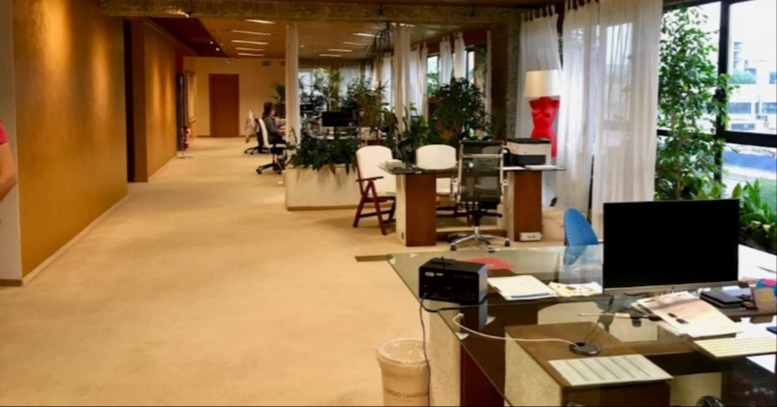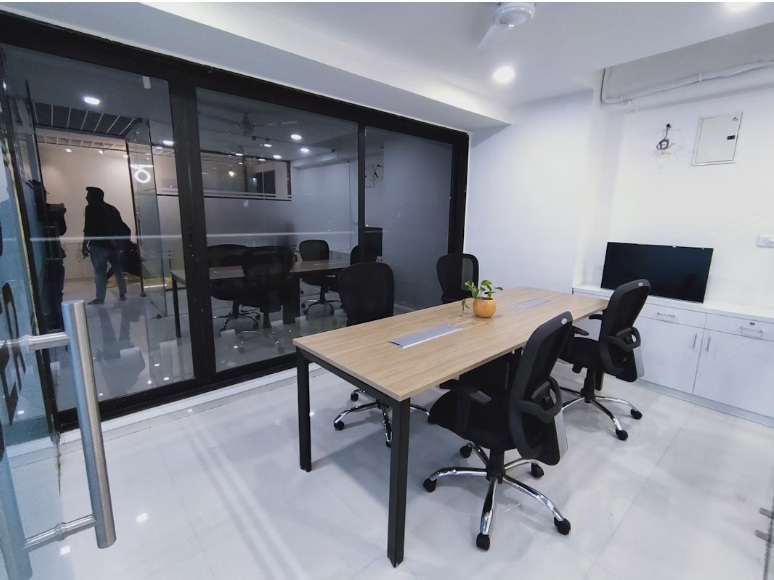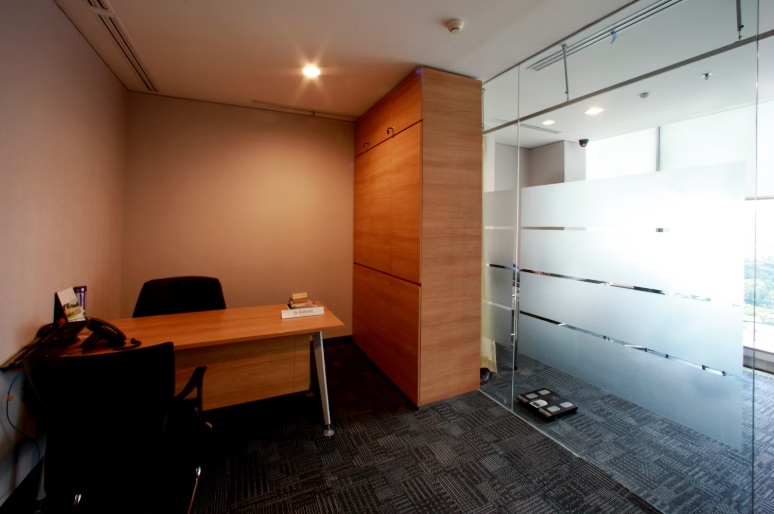Office space
Client-Ready Spaces: Why SMEs Choose Serviced Private Offices
Shyam Sundar Nagarajan / Reading Time : 8 mins

Sarah's investors were flying in from Tokyo on Tuesday. She'd been rehearsing her pitch for weeks, knew her numbers cold, and had the deck memorized. Then it hit her Sunday night: where the hell was she going to meet them?
Her coworking space had beanbags and ping pong tables. Great for Instagram, terrible for convincing someone to hand over two million dollars. The coffee shop she usually used was next to a construction site. Renting a hotel conference room screamed "we have no real office."
By Wednesday, she had keys to a serviced private office. When the investors showed up, a receptionist knew their names, the coffee was actually good, and nobody was playing foosball in the background.
This happens all the time now. SMEs are ditching traditional leases faster than you can say "five-year commitment," and honestly, it makes total sense.
Key chapter:
The Professional Image Advantage
Look, we all know appearance shouldn't matter as much as it does. But I've watched deals die because someone's office had weird stains on the ceiling tiles. It's stupid, but it's real.
Serviced offices solved this problem in the most obvious way possible. You want the fancy lobby? It's yours. Need someone to greet your clients so you don't have to run to the door looking frazzled? Done. Want an address in the financial district without selling a kidney? Here you go.
The address thing is bigger than people realize. I know a consultant who tripled his hourly rate after moving from a suburban business park to a CBD serviced office. Same work, same skills, but now his business card said something different.
What really makes this work is the shapeshifting ability. Meeting one client? Use the intimate four-person room. Hosting a workshop? There's a training room down the hall. Your brother wants to see your office? Give him the full tour like you own the place.
Companies like The Work Project private office space for rent basically figured out that SMEs need corporate-level facilities without corporate-level commitment. You're not renting a box. You're renting credibility on demand.
There's also this weird psychological thing that happens to teams in proper offices. The guy who used to show up in shorts starts wearing real pants. People stop taking calls in the bathroom. Everyone unconsciously ups their game because the environment demands it.
The shared amenities are where you really win. That rooftop garden you could never justify in a traditional lease? Now it's your client entertainment space. The boardroom with the massive TV and video setup? Yours when you need it. The kitchen that doesn't smell like forgotten lunches? Thank god someone else cleans it.
Your clients don't need to know that technically seventeen other companies share your floor. They see your logo on the door, your name on the meeting room booking screen, your company's professional presence. That's all that matters.
Financial Flexibility That Makes Sense

Let me tell you about the stupidest money I ever spent. Traditional office lease, 2019. Three-year commitment. Paid for renovation, furniture, and the works. The company pivoted six months later, needing half the space. Still stuck paying for empty desks until 2022.
Serviced offices avoid this whole mess. The pricing actually makes sense when you do real math, not the fantasy math landlords show you.
Traditional lease math goes like this: here's your rent. Looks reasonable, right? Now add utilities. Internet setup and monthly bills. Cleaning crew. Printer maintenance. Coffee supplies. Toilet paper. That person you need to hire just to deal with all this stuff. Suddenly your "affordable" lease costs twice what you budgeted.
Serviced offices just tell you a number. That's it. That's the actual number. The Internet works when you walk in. The printer has paper. Coffee exists. Bathrooms mysteriously clean themselves (okay, someone cleans them, but it's not your problem).
The scaling thing is huge for SMEs. Got a big project? Add two desks for three months. Project canceled? Drop back to your core team. Try doing that with a traditional lease. Actually don't, you'll get sued.
I know a marketing agency that started with two people in a serviced office. They're now fifteen people in the same building, just more rooms. No moving vans, no downtown, no explaining to clients why your phone number changed. They just kept adding spaces as they grew.
The hidden financial benefit nobody talks about: administrative burden. You know what's expensive? Having your operations manager spend three days figuring out why the air conditioning stopped working. Or having your CEO negotiate with cleaning companies.
Serviced offices often throw in support services that would cost a fortune separately. Need accounting help? Some spaces partner with firms like Onestop CA to offer these services to tenants. Suddenly you're not just saving on space, you're getting back-office support without hiring a full department.
Cash flow management becomes actually manageable. No massive deposits. No surprise maintenance bills. No "the elevator broke and everyone needs to chip in fifty grand" emails. You know exactly what you're paying every month, which means you can actually plan your business finances.
The furniture thing alone saves most SMEs tens of thousands. Ever priced decent office chairs? The ergonomic ones that won't destroy everyone's backs cost more than some people's monthly salaries. In serviced offices, they're just there. When they break, someone fixes them. When styles change, someone updates them.
Here's what really matters: opportunity cost. Every dollar you don't sink into office infrastructure is a dollar you can spend on growth. That fifty thousand you'd spend on fit-out? That's your new developer's salary. Twenty grand for furniture? That's your marketing budget for the quarter.
Banks and investors notice this stuff too. They see you're not locked into inflexible overhead. You can pivot, scale, adapt. In their eyes, you're a lower risk with higher growth potential.
Also read: Best Coworking Offices in Gurugram for Startups and SMEs
Need help with choosing the right space?

Ajay
Sales expert
Ajay and his team have helped 100s of clients with the right spaces.





The Operational Efficiency Factor

You know what I did yesterday? Work. You know what I didn't do? Call three IT companies because the server crashed. This is the unsexy reality of why serviced offices actually work.
When you move into a traditional space, you basically become a part-time facilities manager. The printer breaks? Your problem. Internet goes down during a client presentation? Good luck explaining that while you frantically reset routers.
Serviced offices handle all this background noise. The Wi-Fi just works. When it doesn't, you call one number and someone who actually knows what they're doing fixes it. Revolutionary concept, right?
The IT infrastructure alone would cost most SMEs six figures to replicate. Enterprise-grade internet, proper network security, backup systems, video conferencing that doesn't make everyone look like pixelated potatoes. It's just there, day one, working.
But here's the real kicker: compliance and security. You think you're saving money with that cheap traditional lease until you realize you need to meet data protection standards. Suddenly you're hiring consultants, installing secure access systems, figuring out document disposal policies. Serviced offices already sorted this out. They have to, or bigger companies wouldn't rent from them.
Also read: What is the Perfect Office Size? - Office Size Calculator
Building Teams in Flexible Environments
Hiring is hard enough without your office working against you. I've literally lost candidates because our old office was depressing. Gray walls, fluorescent lights, that weird smell nobody could identify. Talented people have options. They're not choosing the dungeon.
Modern serviced offices know this. They're designed to attract humans who have choices. Natural light, decent air circulation, spaces that don't feel like a hospital waiting room. When candidates walk in, they can picture themselves working there.
The networking aspect is underrated too. In traditional offices, you're stuck with whoever's in your building. Usually an accounting firm and three lawyers. Thrilling. Serviced offices intentionally mix industries. The fintech startup down the hall might need your design services. The consulting firm upstairs could introduce you to your next big client.
Smart companies are using this flexibility to completely reimagine how they grow. Need to expand into a new city? Don't sign a lease and hope it works out. Grab a serviced office for six months and test the market. If it fails, you walk away. If it succeeds, you scale up.
The workspace itself becomes a tool for organizational change. Companies implementing new structures or management approaches need environments that support transformation. Programs like Change Management Training for Managers only work if your physical space reinforces the changes you're trying to make. Serviced offices let you reconfigure as your organization evolves.
Hybrid work is basically impossible with traditional offices. You're paying for empty desks three days a week. Serviced offices figured this out immediately. Hot-desking options, booking systems, smaller permanent spaces with overflow capacity when needed. They adapted while traditional landlords were still demanding five-year commitments for space you'd use 40% of the time.
Need help with choosing the right space?

Ajay
Sales expert
Ajay and his team have helped 100s of clients with the right spaces.





The Bottom Line
SMEs choose serviced offices for one simple reason: they make more sense than the alternative. Full stop.
The math works. The flexibility works. The image works. Everything else is just details.
Also read:
